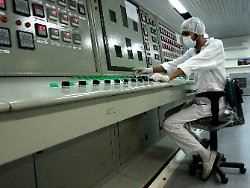Monday 29 November 2021
Nuclear talks are pending in Vienna
The USA and Iran create a threatening backdrop
Five months after the last talks, high-ranking diplomats meet in Vienna to mediate between representatives of Tehran and Washington. Their goal: to save the Iranian nuclear deal. However, that should be extremely difficult. The fronts are hardened.
With a large portion of suspicion and tension, diplomats are making a fresh attempt to save the Iranian nuclear deal of 2015. The talks that began in Vienna in the afternoon had previously been on hold for five months, while in Tehran the pragmatic President Hassan Ruhani left his office to the ultra-conservative Ebrahim Raisi handed over. During this time, the Islamic Republic pushed ahead with its nuclear program, contrary to what had been agreed, and put international nuclear inspectors under pressure. Withdrawing these steps in exchange for the lifting of US sanctions does not seem within reach given the situation.
If Tehran continues to delay a solution, there will be consequences from Washington, threatened US chief negotiator Robert Malley shortly before the new talks in Vienna. “If they do not return to the pact, then we will clearly look at other ways to deal with Iran’s nuclear aspirations – on a diplomatic and other level,” Malley told the US broadcaster NPR. The Iranian chief negotiator Ali Bagheri, on the other hand, accused his Western counterparts of a lack of sincerity on the eve of the meeting. “In our experience, the West does not want to implement the pact,” he wrote in a comment in the London Financial Times.
Five months after the last round of talks, high-ranking diplomats from Germany, France, Great Britain, Russia and China are coming back to the Austrian capital to mediate between representatives of Tehran and Washington. The aim is to save the deal that restricted Iran’s nuclear program to prevent the development of nuclear weapons. In return, Western sanctions were lifted.
But the United States got out of the pact in 2018 under then-President Donald Trump and revived sanctions that seriously damaged the Iranian economy. Tehran then expanded its nuclear facilities, produced almost weapons-grade uranium and restricted international inspections. We are now looking for ways to reduce the escalation steps on both sides. “These talks must not last forever. There is an urgent need to accelerate the process,” wrote Russian negotiator Mikhail Ulyanov on Twitter. He met Chinese and Iranian delegates for informal preliminary talks on Sunday.
